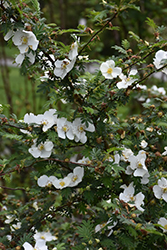It's all about ...
plants

Altai Scots Rose
Rosa spinosissima var. altaica
Height: 4 feet
Spread: 4 feet
Sunlight:
![]()
![]()
Hardiness Zone: 4a
Other Names: Scotch Rose, Burnet Rose, Rosa pimpinellifolia
Description:
This is the species that defines spiny when it comes to roses; the curiously grayish-green stems are almost disturbingly covered in dense sharp spines, makes for an impenetrable barrier; sweetly scented soft white flowers in spring along the stems
Ornamental Features
Altai Scots Rose features showy fragrant white flowers with yellow eyes at the ends of the branches from late spring to early summer. The flowers are excellent for cutting. It has emerald green deciduous foliage. The glossy oval compound leaves do not develop any appreciable fall colour. The fruits are showy deep purple hips with black overtones, which are displayed in early fall. The spiny bark and grayish green branches are extremely showy and add significant winter interest.
Landscape Attributes
Altai Scots Rose is a dense multi-stemmed deciduous shrub with a mounded form. Its average texture blends into the landscape, but can be balanced by one or two finer or coarser trees or shrubs for an effective composition.
This is a high maintenance shrub that will require regular care and upkeep, and is best pruned in late winter once the threat of extreme cold has passed. It is a good choice for attracting bees to your yard. Gardeners should be aware of the following characteristic(s) that may warrant special consideration;
- Suckering
- Disease
- Spiny
Altai Scots Rose is recommended for the following landscape applications;
- Mass Planting
- Hedges/Screening
- General Garden Use
Planting & Growing
Altai Scots Rose will grow to be about 4 feet tall at maturity, with a spread of 4 feet. It tends to fill out right to the ground and therefore doesn't necessarily require facer plants in front. It grows at a medium rate, and under ideal conditions can be expected to live for approximately 25 years.
This shrub does best in full sun to partial shade. It is very adaptable to both dry and moist growing conditions, but will not tolerate any standing water. It is considered to be drought-tolerant, and thus makes an ideal choice for xeriscaping or the moisture-conserving landscape. It is not particular as to soil type or pH, and is able to handle environmental salt. It is highly tolerant of urban pollution and will even thrive in inner city environments. This species is not originally from North America.
This plant is not reliably hardy in our region, and certain restrictions may apply; contact the store for more information.
